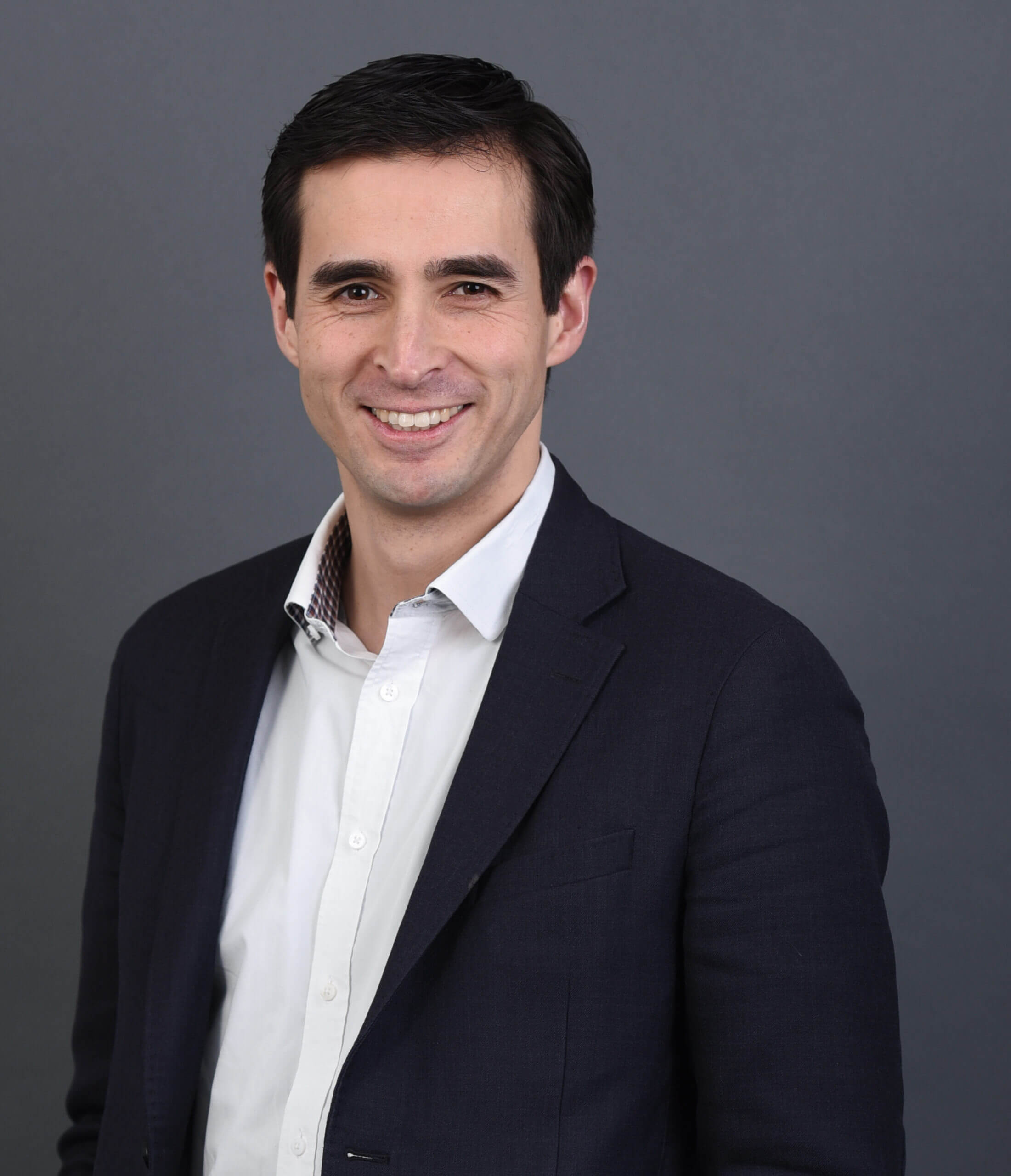Andrew Lynn is an entrepreneur and executive with a focus on life-science and physical-science ventures. Andrew founded Orthomimetics, a regenerative orthopaedic devices company, based on his PhD research conducted jointly at the University of Cambridge and the Massachusetts Institute of Technology.
How did you kick-start your career as an entrepreneur? How did this lead you to found Fluidic?
Andrew Lynn – founder, CEO: I didn’t expect to be an entrepreneur at all, I finished my PhD in material science and orthopaedics, then I expected to play volleyball or travel. Fluidic is now my third company. It’s pretty easy to become hooked: I tried it, I liked it, and I’m still here!
What was the vision of Fluidic Analytics compared to what it is now?
We started with the vision of transforming healthcare by having a real-time complement to the genome. The genome will tell us what might happen, biologically speaking, over the course of our entire lifetime, which is great. But the genome doesn’t tell us much about what is happening right now — of answering the question ‘what can I do now to keep myself healthy today?’
The idea of being able to provide a product that just completely revolutionises how we understand how biology happens in real time – that gives people the chance to do something about their health when they need to, and not worry about it when they don’t – is just so inspiring. In terms of opportunities to do something that makes a real difference, they don’t come much bigger than this. That was our vision almost from the day that Tuomas Knowles and I met, and it’s still our vision now.
Where are you in terms of road map compared to what you envisaged when you started this journey six years ago?
The specific products we’re developing definitely look a little different than how we initially envisaged them. And that’s a good thing. One of the most important lesson’s we’ve all learned is the importance of getting moving above all else – of learning important lessons, fixing your mistakes and adjusting your course. One of the wisest statements I’ve heard is “Success is not the sum of luck, strategy and execution, it’s the product of those three.” That’s so true. If one of those is zero, you’re screwed. But if you hold your own on two of the three and then truly outperform on the third – be it luck, strategy or execution – you can create a truly transformational business. We’ve long known we’re lucky to have this opportunity, and we’ve always been confident that we have a winning strategy to capitalise on this luck. But having grown the team from 35 to over 90 people over the last year and a half, it’s now time for us to execute. But one of the really exciting things about our business and where we sit in this industry is that, when we do start firing on all cylinders, this execution will pave the way to realising a vision that could transform healthcare for everyone everywhere.
“Success is not the sum of luck, strategy and execution, it’s the product of those three. If one of those is zero, you’re screwed. But if you hold your own on two of the three and then truly outperform on the third – be it luck, strategy or execution – you can create a truly transformational business.”
Is there any advice you would give to your younger self?
I set up a business prior to Fluidic, where we made a good few mistakes. We didn’t put enough emphasis on team and culture. With Fluidic, we put a lot of attention into it from day one and followed the “Built to Last” philosophy: Get a common language, a set of common behaviours and a common understanding of what you will and won’t do. Nothing guarantees success, but a good way to guarantee failure is pulling in different directions or not being clear on which direction you’re going. Paying attention to values and guiding principles ensures that you’re all pulling in the same direction. Talking to IQ Capital and its other portfolio companies really reinforced just how to set out a great model in which to maintain this philosophy.
One of the approaches that we’ve taken is to spell-out habits and behaviours that we think are great examples of our guiding principles. Two examples of this are “Argue like you’re right and listen like you’re wrong” and “Give honest, timely feedback – don’t take it personally.” And we try to put these two behaviours into action by doing something called “three and three” at the end of every meeting. This is really simple concept where the group lists three things that we did well (whether in the meeting or in the project as a whole) and three things that could have been better. We’ve found this really helps create a safe space for our newer employees in particular to understand how we speak and listen, how we give and receive feedback – how we improve together.
“Nothing guarantees success, but a good way to guarantee failure is pulling in different directions or not being clear on which direction you’re going. Paying attention to values and guiding principles ensures that you’re all pulling in the same direction.”
What advice would you give to founders when hiring?
“Hire the best people you possibly can” is the advice that everyone will give you, and there’s a good reason for that: it’s absolutely true. But another more subtle lesson that I’ve learned more recently is to be careful of title inflation. We had to make some changes in our executive team and senior leadership team because we got this wrong. We rewarded brilliant technical talent by promoting them to senior management positions. But when it comes to interacting with and being a leader within a much larger team, even the most exceptional talent alone doesn’t always translate to good management. Title inflation, premature-promotion or whatever you want to call it can end up bogging down a phenomenal technical talent with management responsibility that they may not be suited for or be happy assuming. If you think something’s not right, even if it appears on the surface that things are going smoothly, don’t be afraid to shake the tree every once in a while. It’s the management job to make sure that things are as they seem on the surface. It’s not an insult that you’re checking up on your team, and there’s a big difference between asking to understand key details and micromanagement. A good, healthy team can have open dialogue and share information so that they’re all on the same page, as opposed to everyone managing its own territory – that’s not a healthy approach. When you see overly territorial or defensive behaviour, it can be a sign that someone is swimming in waters that are too deep for them. Everyone makes mistakes at all stages, no matter how senior their position. But sometimes people who are out of their depths don’t to hire quality people around them, and this is when real problems start to compound themselves. It’s part of a leader’s job is to spot when a team member is falling into this trap – including when that team member in question is that leader themself!
“Even if you think things are going smoothly, don’t be afraid to shake the tree every once in a while. […] Everyone makes mistakes at all stages, no matter how senior their position.”
How did you select your board? How do you interact with them now?
We’ve tried to be proactive about getting Non-Executive Directors (NEDs) in place and worked really hard at identifying NED candidates who can add solid value in both the area we operate in now and the direction we are going. You need a board who are capable of critically evaluating and shaping the plans you put forward. But a major mistake that early founders sometimes make is waiting for the board to tell them what to do. That is not why IQ Capital invests in firms. They invest in founders and management teams because they think they can run their businesses in a way that nobody else can. It’s imperative that you’re not afraid to put ideas in front of the board that might be shot down. If you’ve chosen your board well and are communicating with them properly, there should be times when they, as your company’s qualified advisors, will shoot your ideas down! Throwing these ideas around, thinking laterally and drawing the collective experience of a great board is a real key to kick-starting the sorts of engaging discussions that help your business thrive.
“A major mistake that early founders sometimes make is waiting for the board to tell them what to do. That is not why IQ Capital invests in firms. They invest in founders and management teams because they think they can run their businesses in a way that nobody else can.”
Any advice for later stage founders about how to approach an exit?
You have to ask yourself the question, “What do I want from this?” That’s a question that can be surprisingly difficult to answer honestly. Especially in healthcare, it’s very easy to give the answer that you think that patients or your investors want to hear and to feel that you’re being selfish if you thinking about yourself. But if your goal is to build a world-changing business, you’re not going to do it if you burn out or lose motivation. So if the outcomes that you, personally, are looking to achieve has to do with the effect you have on society, the contacts you make, personal financial reward, all three of these things or something completely different, don’t be afraid to articulate them. Similarly, don’t be afraid to be bold. At Fluidic, we’re very open about the fact that we want to build the most influential and valuable life science company ever! But the simple act of articulating an objective in those terms makes it easier to attract board members and investors that have the right skills to push you along the path towards that vision by asking how we are going to get there, and how the business is going to survive along the route to our end goal. For any given business. That end goal might be an exit or it might mean continuing to grow the business. My view is to know where you’re going but be prepared to revise your plans every step of the way to get there.
How do you challenge yourself? What would you do to keep yourself running and thinking?
Our two children are very good at keeping me on my toes, so there is no shortage of challenge on a personal level! On the professional level, my team is better at their individual jobs that I could ever be. So I find the guiding principles really stimulating, and being the steward of those is something I view as a big part of my job – What are we striving to achieve? How do we communicate? What standards do we hold ourselves to? What do want people to think of when they think of Fluidic? These are the hallmarks of our culture that I think it’s my job to be accountable for.
I also enjoy exposing myself to new thoughts and new ideas. Jim Collins, Aswath Damodaran and Scott Galloway are all people whose ideas I’ve found really influential. I keep myself interested within the business by trying to find ways to apply new concepts from thinkers like these that are specifically useful to Fluidic. Sometimes they work, sometimes they don’t, but irrespective I consider it an essential part of my role to find ways to make our business succeed in ways that no other business has succeeded before.
What were the biggest challenges over the past 15 years? How do you deal with the pressure of being a self-founder?
After my first company, I worked for the acquirer for a short amount of time. To be perfectly candid, that was not a pleasant experience. But it was a massively important one. Sometimes things don’t go the way you think they should, and it’s incredibly valuable to have had the experience of being on the matt – of feeling a bit of pain –then picking yourself back up again. I can genuinely say that I’m a million times better at my job now for having gone through those hard times under our acquirer – that’s not to say I was able to appreciate the value of those experience at the time, but I certainly do now. These experiences included watching some other CEOs make some mistakes that I surely would’ve made had we continued on with the first business. I watched CEOs get right things that I would have screwed up. Paired with the many mistakes that I myself have made along the way, I can definitely say that I’ve learned some valuable lessons.
One of these lessons is, in fact, that being a sole founder is no substitute for having a great founding team. To be honest, I’m not a big fan of the word “founder” at all. I get why it’s important – especially for recognising scientific founders in deep tech companies like ours. But I just don’t think it adds much for people in roles like the management ones I enjoy most. If the chief exec isn’t moving the business forward, a “founder” or “co-founder” tag shouldn’t influence how they are held accountable. So, finding someone or a group of people who you can work with – with whom you can have disagreements and still move on, with whom you are more than the sum of the parts – is something I consider myself really lucky to have had the chance to experience. And I’m definitely better for it.
Why IQ Capital?
When we met (way back before Fluidic), we very quickly established that there would be no non-sense between us. Those first discussions we had back in 2009 didn’t lead to an investment, but when we came back with Fluidic, there was already a connection, a relationship and a trust that made working together a no-brainer. There’s a notably different culture here than with other venture capital firms. It’s this no-nonsense yet personable approach that makes IQ Capital a breath of fresh air in the venture community. Max, Kerry and Ed are different yet complementary personalities, respectful yet unafraid to challenge each other. This really comes through in the way that IQ treats its entrepreneurs and its companies. When we need to have difficult conversations or when we need advice or support, I can always rely on them to be on the other end of the phone.
“It’s this no-nonsense yet personable approach that makes IQ Capital a breath of fresh air in the venture community. Max, Kerry and Ed are different yet complementary personalities, respectful yet unafraid to challenge each other. This really comes through in the way that IQ treats its entrepreneurs and its companies.”


"The cross disciplinary technical exposure that IQ has is incredibly valuable to all of their portfolio companies."
